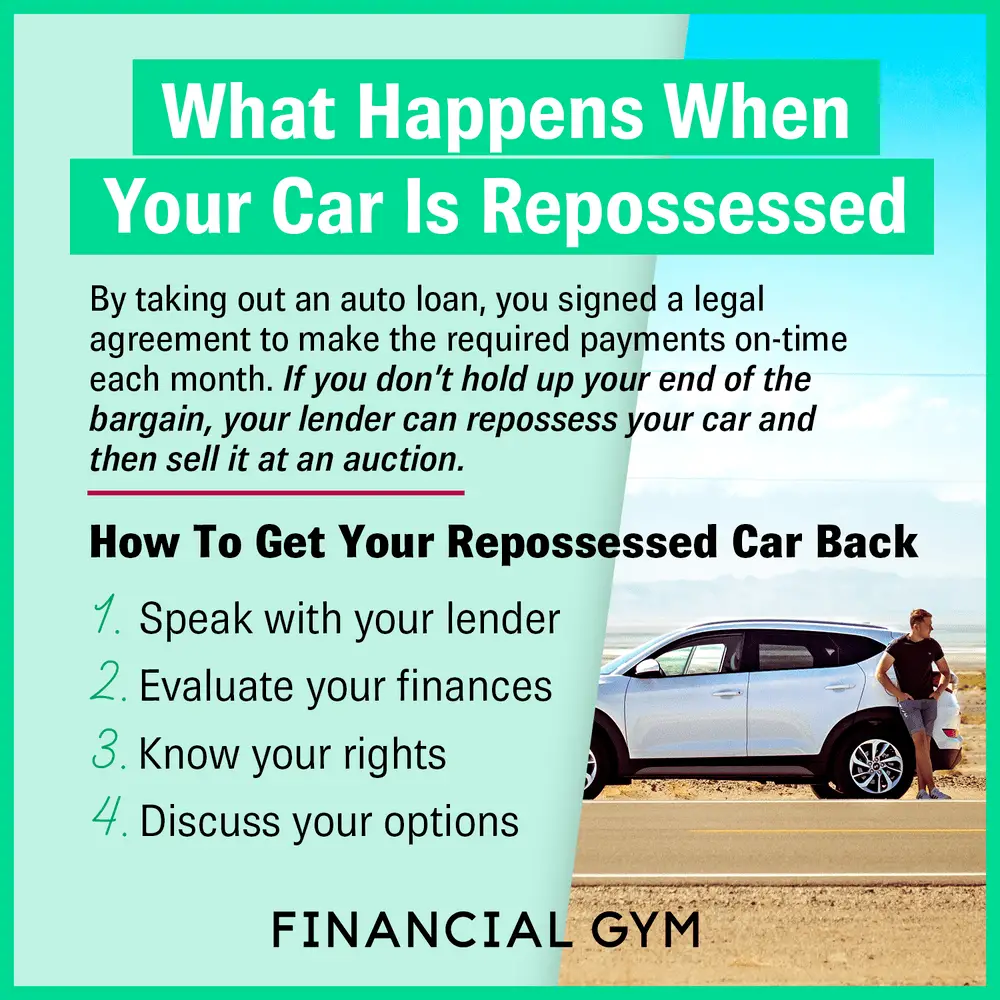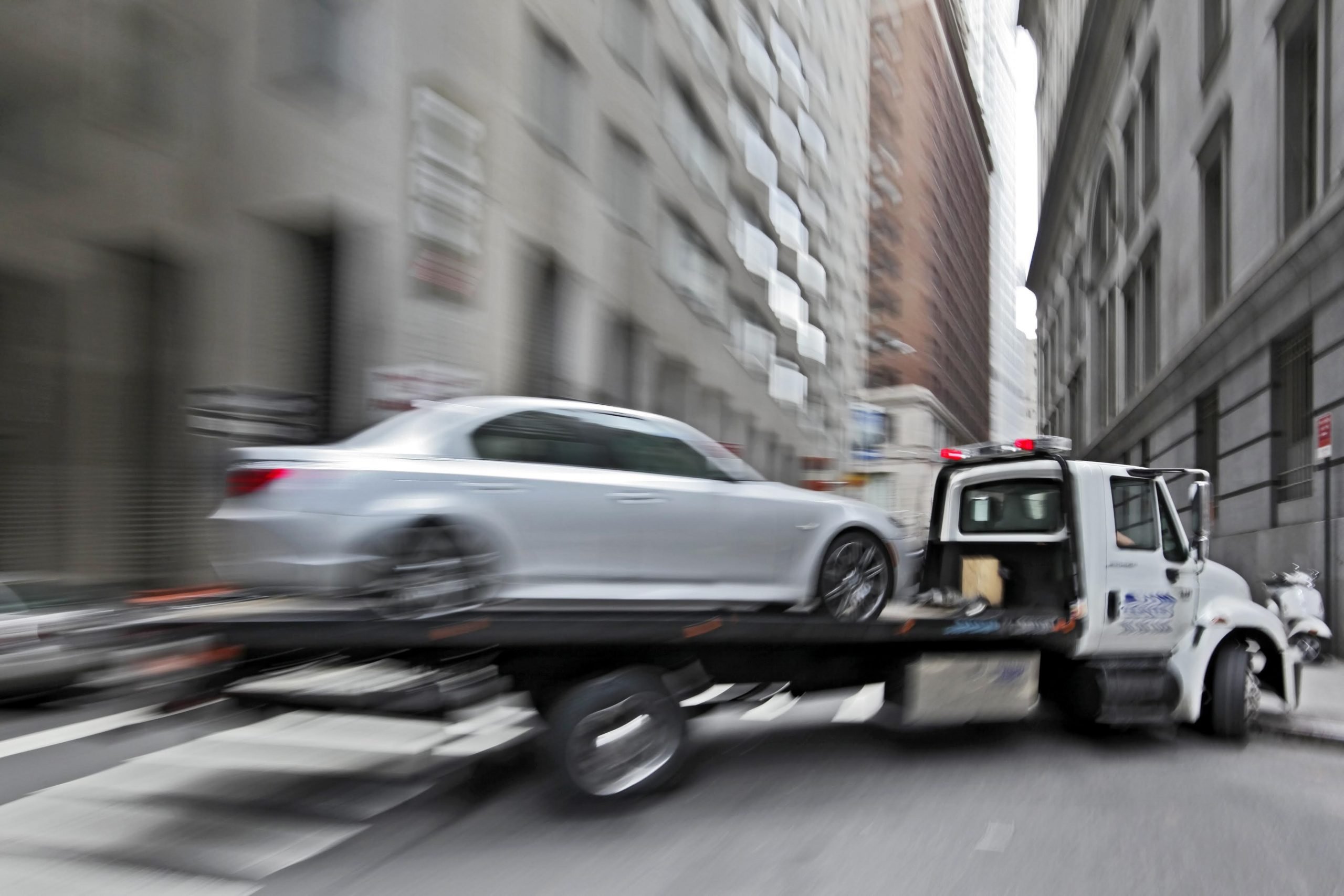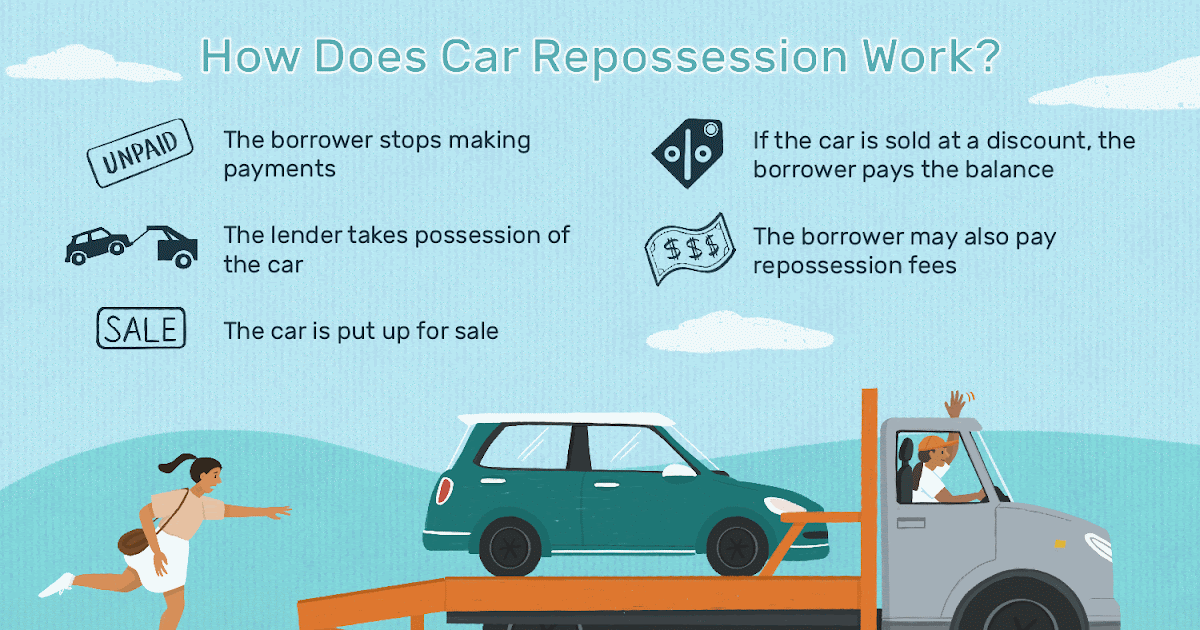Frequently Asked Questions About Car Repossession
-
Can I hide my car to avoid repossession?
No. Its a crime to intentionally hide your car to avoid repossession. Plus, its going to backfire on you financially. The harder you make the repo guys job, the more theyll charge the bank, and that cost will be added to the amount you owe.
-
Can the lender take my belongings inside the car?
No. Your lender is entitled to repossess the car, but they have no right to any of your personal property that may be inside it. They are legally required to return loose items in the same condition they were found, at no charge to you. If you installed a sound system or changed your tire rims, the lender isnt obliged to return those.
How Many Car Payments Can You Miss Before Repossession
In many states, your lender has the right to repossess your car after you’ve missed only one payment. Many lenders will give you more time, though, and many states require detailed notice before your lender repossesses your car. If you think you’ll miss a payment, contact your lender before it happens.
How A Creditor Collects A Deficiency After Repossession
The lender can ask you to pay the outstanding amount voluntarily. However, before forcing you to pay, the lender must prove that you owe the deficiency amount in court and get a “deficiency judgment” against you.
A creditor with a deficiency judgment can force payment by:
- taking your wages using a wage garnishment
- withdrawing your bank balance with a bank levy, or
- selling other assets through property seizure.
You May Like: Walmart Car Key Copy
S To Get Back On Your Feet After A Car Repossession
Tuesday, Aug 11 2020
Having your car repossessed can leave you feeling helpless. But there are many ways to recover after car repossession and get you back on your feet. These situations can be a major inconvenience. You likely depend on your vehicle to get you to work, school, the grocery store, or other important appointments.
The first thing you should know is that youre not alone. Every day more than 5,000 cars are repossessed in the United States. According to the Federal Reserve Bank of New York, auto loan default rates are more than 30 percent. As economic times become more challenging car repossession can happen, even to those who had historically been able to keep up with their payments.
Avoid Getting Your Car Repossessed Call Obryan Law Offices Today

Many people remain unfamiliar with the technicalities of repossession. Hopefully this post helped you understand what happens when your car is repossessed. To avoid repossession altogether, there are some simple measures you can take. These include making payments on time, limiting how many credit accounts you open, and paying down your credit card debt in regular intervals. Our attorneys at OBryan Law Offices can help you formulate a plan to do this. We can also assist you in filing for bankruptcy, should it come down to that.
The most important thing you can do in the event that your property becomes repossessed is to know your rights. The repossession process can be extremely challenging to deal with and often leaves people wondering where to turn next. In danger of car repossession? We can help. If you have any more questions like What happens when your car is repossessed?, today.
Read Also: How To Remove Scuff Marks From Car Door Panels
What Are The Consequences Of Having Your Vehicle Repossessed
According to the Federal Trade Commission, there is a lot of information available if you have found yourself in the midst of a vehicle repossession. If you happen to be in a state where a lender can repossess the car right away, this can happen almost immediately after defaulting on a loan or lease. This means that the owner can send someone onto your property without notice to repossess the vehicle.
In some states, the lender has more rights to get the car back. The FTC says this includes using physical force, threatening to use force, or even removing your car from a closed garage without your permission. After that, the lender can either keep the vehicle to cover the debt or sell it. In some states, the lender has to tell you what the plan is.
If the car goes up for sale at an auction, some states require the company to let you know. You are entitled to go to the auction and bid on the car to get it back. Sometimes you can buy the vehicle back by paying the full amount owed. This means paying back the amount owed, costs related to the repossession, and anything else associated with the repossession.
How Can I Prevent A Repossession
If you notice that the lender intends to repossess your vehicle, you must act quickly the time between the notice being given and the repossession truck starting to look for your vehicle is only a matter of days. There are several ways to prevent a vehicle from being repossessed:
One option is to refinance the car or truck with a different lender. You may be able to refinance your vehicle with a different lender, which will make the loan instantly current. As a bonus, you may even get a lower interest rate and/or payment on the new loan.
Another option is to sell the vehicle to capture any equity. This can work if the vehicle is worth more than you owe. Instead of letting the bank reap any equity in the vehicle , you can sell the vehicle and keep any equity after the loan is paid off, or trade the vehicle in on a different vehicle, using the equity as a down payment. You may come out ahead if you sell or trade in the vehicle to take advantage of any equity once the vehicle loan is paid off.
If you file a Chapter 13 bankruptcy, then you can use the Chapter 13 process to catch up the car loan delinquent payments over time. Also, it is sometimes possible to reduce the interest rate on the vehicle loan to make it less onerous to pay on, stretch out the amount of time to pay on the vehicle loan, or even reduce the amount that you have to pay on the loan to pay it off.
Also Check: How To Get Car Title In Florida Online
Canadian Auctions/potential Suit Against You
When a lender repossesses a vehicle, they will almost immediately sell it at an auction and apply the proceeds to the debtor’s loan. While there are auctions throughout Canada, one of the largest auctions in the country is the Toronto Auto Auction. When the lender applies the proceeds to your loan, he will note whether there is an additional balance due. Depending on the laws of that province, the lender may well sue you for the shortfall.
References
Get Cheap Car Insurance Quotes
- Save up to £324 on your car insurance*
- Compare over 132 insurance providers
- Enjoy Confused.com rewards
If you lease or finance your car, it still belongs to the lender until youve paid it off entirely. The company also has the power to seize it if you fall behind with your payments.
Repossession isnt an easy process to go through, and it can have consequences for your financial future too. However, you do have option to recover from having your car taken away from you.
Read Also: How To Fix Clear Coat On Car
Who Can Help Me
The prospect of losing your vehicle to repossession can be extremely stressful. If you are unable to make your vehicle payments and you are concerned about vehicle repossession, reach out to a LIT today. You dont have to navigate through this process alone.
You can reach out to a LIT at Adamson and Associates and schedule a free consultation. Call 519-310-JOHN or contact us online.
The Right To Reinstate The Loan
You might also have a right to reinstate the car loan. To reinstate the car loan, you bring the loan current by making up all of the past due payments, including applicable fees and late charges, in one lump sum. Reinstatement could be an option for you if you can’t pay the car loan off in full. You can reinstate the car loan only if your state’s law allows it or if your loan agreement specifically states that you have this right.
Read Also: What Percentage Do Car Salesmen Make
What Is A Car Repossession
Typically, when you purchase a new vehicle you take out a loan to pay for part or all of it. At that time, you signed an agreement with the lender to get a loan which holds you legally accountable for making monthly payments on the vehicle. If you miss a payment the lender who gave you the loan has the right to repossess your car.
If you have missed a payment make sure you are talking to your lender.
A missed payment is one that is more than 30 days late. It takes time, money, and effort to repossess a car. So, although the lender has the right to repossess the car after only 30 days, they typically wont repossess it after missing just one payment. Most lenders will proceed with repossession after a borrower misses two or three consecutive payments. And these lenders move forward with repossession if they havent heard from the borrower. Lenders do not want to spend a lot of time trying to contact the borrower. So, if you have missed a payment make sure you are talking to the lender.
Is My Car Insurance Affected By A Repossession

Yes, insurers typically view you as a high-risk driver after your car is repossessed, and they hike your premium to compensate.
Another reason that your car insurance rates increase is that repossession hurts your credit score, knocking 50 to 150 points off your credit score. It stays on your credit history for seven years, even if its a voluntary repossession. To repair your credit score faster, pay off the remaining loan balance and make timely payments on your other credit cards and loans.
Your insurer will pull your credit score and see a spotty payment history unless you live in a state that bans this practice. Those states include California, Hawaii or Massachusetts.
Don’t Miss: How To Paint Car Interior
How Does The Car Repossession Process Work In Canada
Repossession laws can differ based on the province in which you live. For instance, in Alberta and British Columbia, they have what is called a seize or sue law. With this law, the creditor has a choice, they can either seize the vehicle from the debtor or, they can sue the debtor for the amount owed. Its up to the creditor to determine which way they want to go but they cant do both.
This is not the case in Ontario. In Ontario, the creditor has the right to seize and sue for the balance remaining on the loan.
While repossession laws vary between provinces, the types of vehicle repossession are consistent across the country. There are two types of repossession include involuntary repossession and voluntary repossession.
Can A Car Be Repossessed Without Notice
Yes and no. Your car will not be repossessed without going into default first. Going into default means you have not paid your monthly payments for a priorly-agreed upon timeframe. When you miss a monthly payment, or you go into default, the auto loan company will send you notifications and phone calls to see why you are missing your payment or tell you that you are in default.
Once this has been done, they will come and repossess your car without warning. They can do this at any time and do not have to find you to let you know they are taking your car when they arrive.
Recommended Reading: Disconnecting Car Battery When On Vacation
After A Voluntary Surrender
After you surrender your car, the lender typically puts it in storage before its sold privately or at auction to try to recover the loan balance still left on the vehicle. Youre typically required to pay those storage fees, and many storage companies charge daily.
Before an auction, your lender is required to let you know when and where the car is being sold. You have the right to bid on the vehicle and win it back but if you win, youre still responsible for the total loan balance and additional fees associated with the surrender.
Hope the sale proceeds are enough to cover your remaining loan balance if theres still a balance youre also responsible for paying it. For example: if your car sells for $5,000, but you owe $8,000 on your loan, you still owe the lender that $3,000 plus additional fees associated with the surrender.
The voluntary surrender is reported on your credit reports as a repossession. And if you choose to surrender the car because you defaulted on the loan, the default is also listed on your credit reports. However, a future auto lender may view a voluntary surrender more positively than a traditional repo, because you took initiative and returned the car yourself.
How The Proceeds From The Auction Are Used
When a repossessed car is sold at auction, your stateâs laws list who receives the money from the sale, or the proceeds from the auction. Generally, the first thing paid is the cost of selling the car at the auction and the cost of car repossession. This includes the costs of towing and the tow truck while the repo man does his job, storing the vehicle before auction, and attorney fees for the loan company.
After these costs are covered, the loan company needs to use the rest of the money to pay down the auto loan. This money is used to pay fees for late payments, interest on the loan, the loan balance, and any other penalties from the loan company. Any money left over after everything is paid gets returned to you, although this doesnât usually happen.
In most cases, after the auction, there isnât enough money to cover the loan balance after the car repossession costs are paid. Many people donât make a large down payment on their new car, so they donât have enough equity in their vehicle to pay everyone.
Read Also: Car Rentals With Aarp Discounts
Find Out If You Still Owe Money After The Car Is Sold
Lenders sell repossessed vehicles at auctions or private sales so they can recover their losses. Often, the vehicles may sell for less than the amount owed on the loan. This is whats known as a deficiency balance. If the borrower fails to pay this balance, it can lead to contact from debt collectors, possible legal action, and negative credit reporting.
What Is A Deficiency
If your vehicle is repossessed and sold for an amount that doesnt cover the entire balance, you are not in the clear. You are still responsible for paying the deficiency which includes any amount remaining on the balance of your loan, costs associated with the repossession, late payment fees, and interest charges.
Also Check: Car Rental 8 Legit
When A Lender Can Take Your Car
In many states, your lender can take your car as soon as you default on your loan or lease. Your contract should say what could put you in default, but not making a payment on time is a typical example.
Once youre in default, the lender may be able to repossess your car at any time, without notice, and come onto your property to take it. But the lender cant breach the peace when they take it. In some states, breaching the peace includes using physical force, threatening to use force, or even removing your car from a closed garage without your permission.
How Car Repossession And Deficiencies Work

When you buy a vehicle on credit, you must agree to give the lender a “lien” allowing the lender to repossess your car if you don’t pay as agreed. If you fail to pay and your car is repossessed, the lender will sell it at auction and apply the sales proceeds to your loan.
Most states don’t require a court proceeding before the lender takes or “repossesses” your car. But you’re likely entitled to receive a notice telling you the sale’s date and location.
Also Check: How To Repair Cigarette Burn In Car Headliner
When Can A Vehicle Repossession Happen
Repossession can occur as soon as you default on repayment. Your loan contract will define what the lender considers a loan default, but it can be triggered by missing just one payment.
Though a loan contract may give a lender the right to take your car away after you default, the lender will typically will alert you of your missed payments and attempt to collect payment prior to repossessing the vehicle.
When a vehicle owner is in default and is non-responsive to the lender’s attempts to remedy the missed payments, the creditor may choose to repossess the vehicle. In most states, the law doesn’t require lenders to provide advance notice of a repossession, which means they can come and take your vehicle at any time once you’re in default.
Repossession could also occur as a result of not having proper insurance for your vehicle. Though at least basic auto insurance is required in all states, if you allow your insurance policy to lapse, your lender may consider this a reason to repossess your car. Lenders have an interest in protecting their investments, and since they hold your vehicle as collateral for your loan, a car without insurance poses potential risk.
